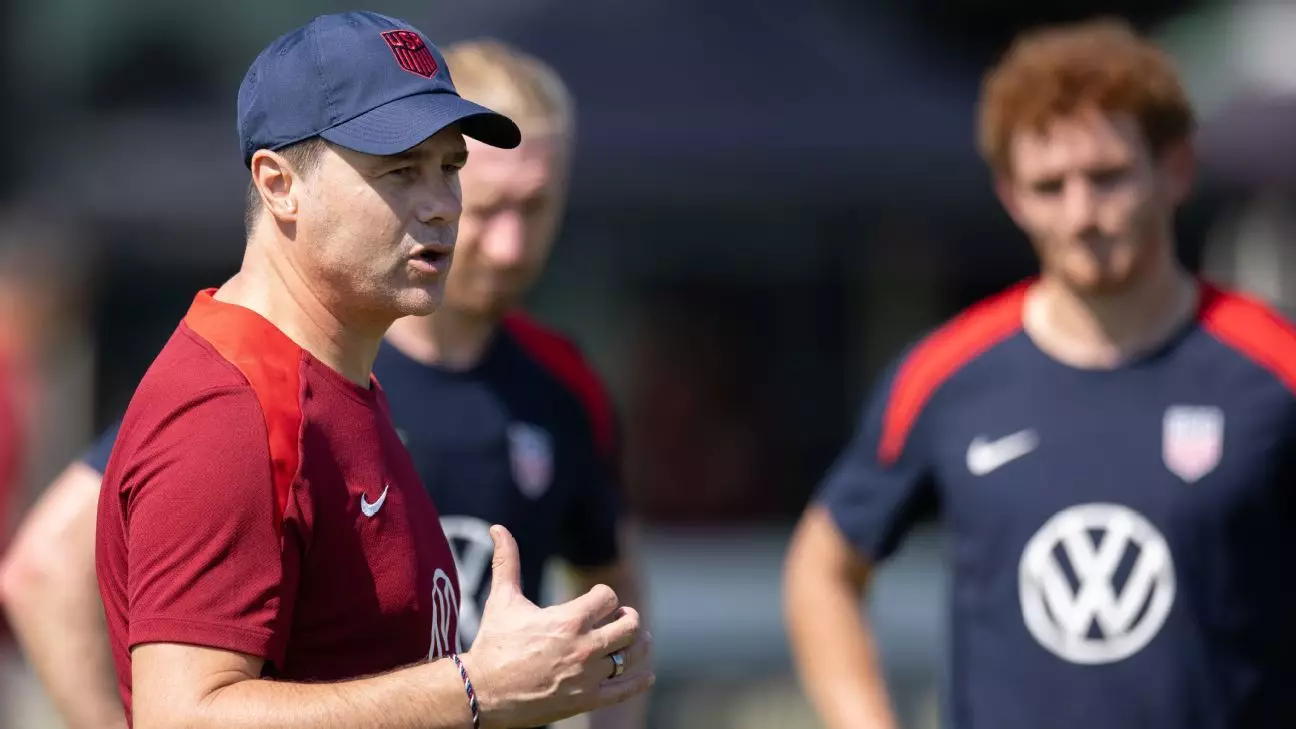As the United States gears up to co-host the 2026 FIFA World Cup alongside Canada and Mexico, newly appointed head coach Mauricio Pochettino is keenly aware of the monumental expectations that accompany this prestigious event. The stakes are higher than ever, and Pochettino understands this not merely as an obligation but as an opportunity to galvanize soccer culture within the country. His recent remarks underline a pivotal message: the US men’s national team (USMNT) needs active engagement and enthusiasm from fans to thrive.
Embracing the Challenge Ahead
Pochettino’s recognition of the “massive, massive responsibility” reflects the weight of history and the potential impact that the upcoming World Cup can yield. The last time the U.S. hosted the World Cup in 1994 marked a significant turning point for soccer in America, sparking a series of developments that eventually led to the founding of Major League Soccer (MLS). This upcoming tournament not only serves as a chance to showcase soccer but also as a platform to rekindle the fire that the sport ignited years ago. Pochettino’s vision is clear: he aims to capitalize on the nostalgia and enthusiasm stirred by the 1994 games, fueling a revival of support for the national team.
The Role of Fans in the Journey
Integral to Pochettino’s philosophy is the belief in the power of the fan base. He recognizes that the atmosphere created by supporters can significantly influence player performance. By encouraging fans to embrace their role in this journey, he aims to foster a sense of collective identity and pride within the soccer community. As he stated, the fans’ involvement is essential in nurturing an environment where players can thrive without the added pressure of expectations. “If you put too much pressure on,” he warned, “then you stop expressing your talent.”
Pochettino’s approach advocates for emotional connectivity with fans, asserting that their unwavering support could cultivate the confidence necessary for players to excel on the global stage. By stressing the need for fans to “buy into” the vision of a thriving soccer culture, he is not just calling for attendance at matches but a deeper, reciprocal relationship that empowers both players and supporters alike.
Despite his aspirations, the road leading to the 2026 World Cup has been fraught with challenges for the USMNT. Recent performances, particularly at the 2024 Copa America, raised eyebrows among fans and critics alike. The national team’s inability to progress beyond the group stages was a stark reminder of the work ahead. A humbling 5-1 defeat to Colombia in a friendly illuminated vulnerabilities that Pochettino aims to address. By directly engaging with supporters, he hopes to pivot away from disappointment towards a more optimistic and competitive outlook.
Honing in on the fundamentals of the game, he emphasizes the need for the team to overcome recent setbacks. “Together, we need to build that confidence,” he contends, envisioning a united push towards rebuilding the team’s reputation and performance. His words echo the sentiment of many—soccer is a sport that deserves a prominent place in American culture, one that is slowly being recognized by a broader audience.
Pochettino’s overarching narrative is not simply about the immediate results; it’s about laying the groundwork for a sustainably successful soccer environment in the U.S. This mission involves nurturing a new generation of talent and encouraging a cultural shift towards soccer appreciation. He sees the sport not just as an athletic endeavor but as a means to unite people from various backgrounds under a common passion.
The coach’s inspiration comes from soccer-centric countries like Germany, Argentina, and Brazil, where passion for the game runs deep. By fostering a similar enthusiasm in the U.S., he believes that soccer can become a fundamental aspect of American culture. Through purposeful collaboration with fans, players, and stakeholders, Pochettino seeks to inspire a shared vision—where the love for soccer resonates far beyond the confines of a stadium.
As the USMNT stands on the precipice of a historic World Cup, the call to unity resonates louder than ever. With Pochettino at the helm, the hope for a competitive and compelling 2026 is very much alive. The future of soccer in the U.S. depends on a collective effort to ensure that the beautiful game isn’t just played but passionately embraced.

